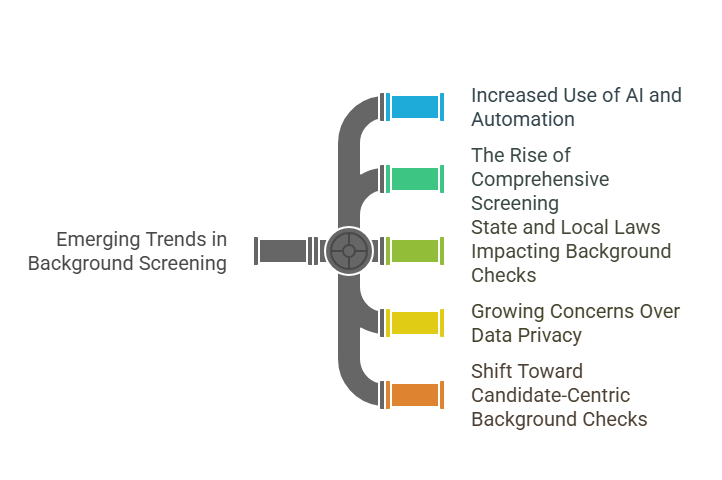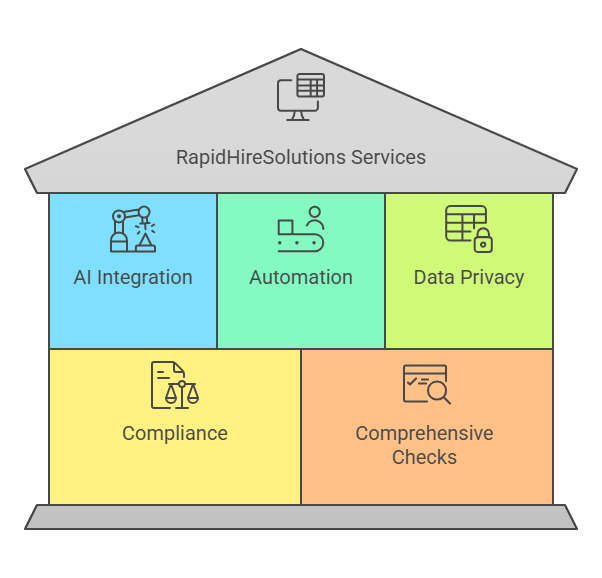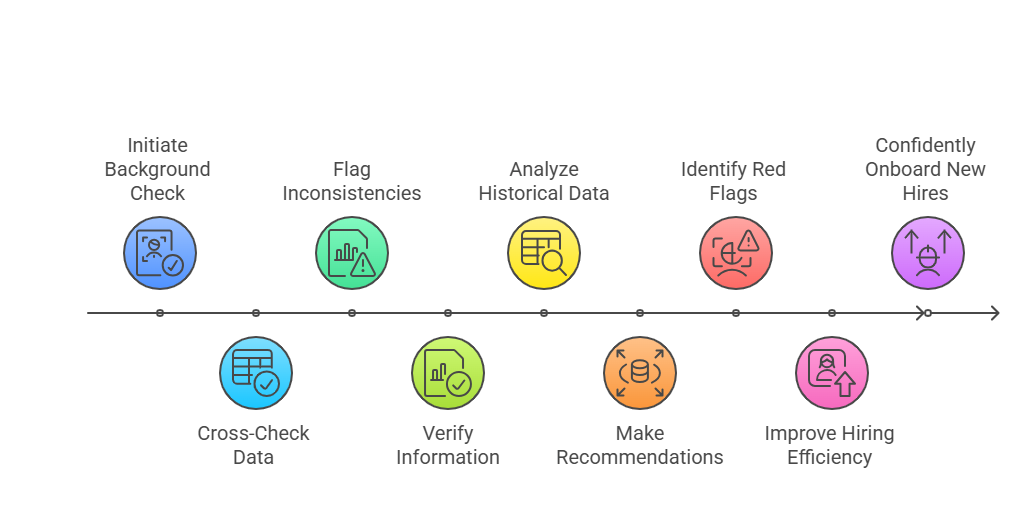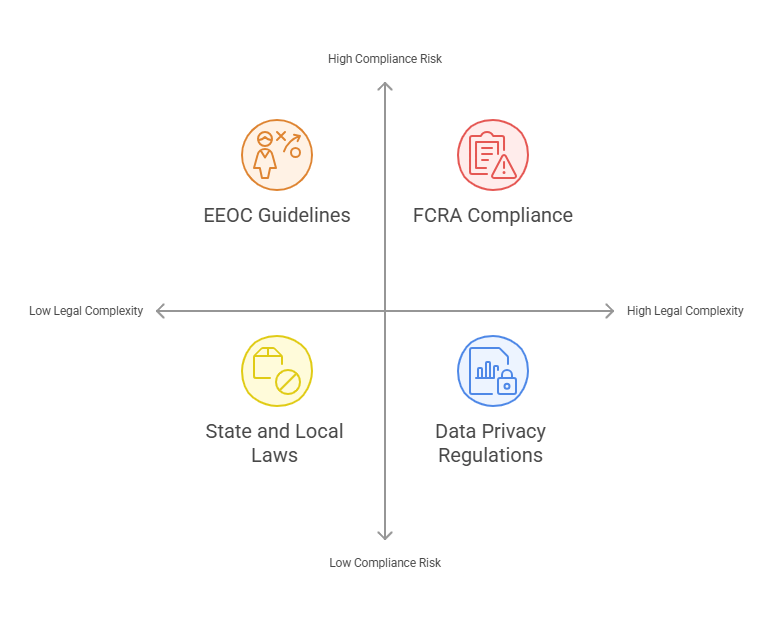2025 Background Screening Industry Trends: Key Insights for Employers and HR Professionals
Background screening is a critical step in the hiring process that enables employers to verify the credentials, qualifications, and overall suitability of a job candidate. It encompasses a variety of checks designed to validate the information provided by a candidate, ranging from criminal history checks to employment and education verification. Background checks are vital for employers to minimize risk, maintain a safe workplace, and ensure they hire individuals who meet the qualifications for the role.
For HR professionals, background screening is a strategic tool that enables them to assess the character and reliability of potential hires, ultimately contributing to better decision-making. With advances in technology and regulatory changes, the landscape of background screening is evolving rapidly. As employers face increasing competition for talent and rising challenges around legal compliance, understanding the latest trends in the background screening industry is essential.
Key Types of Background Checks
The primary types of background checks that employers typically conduct include:
- Criminal History Check: This is one of the most important background checks, as it reveals whether a candidate has been involved in criminal activities. It helps employers protect their organizations from potential liabilities and create a safe working environment.
- Employment Verification: This check verifies a candidate’s previous employment, job title, dates of employment, and performance, helping to confirm the accuracy of the information provided by the candidate.
- Education Verification: Employers use education verification to ensure that candidates hold the degrees, certifications, or qualifications they claim. It prevents the potential hiring of candidates with fraudulent educational backgrounds.
- Drug Testing: Some employers also opt for drug testing to ensure that candidates are not using illegal substances, which is essential for workplaces where safety is a priority.
- Credit History Check: Especially relevant for positions that involve handling finances, credit checks can help employers determine whether a candidate is financially responsible.
- Social Media and Digital Footprints: In today’s digital age, many employers have started to include a review of candidates‘ online presence, including social media activity, to assess their character and potential fit within the organization.
These background checks help employers make informed decisions, protect their reputation, and maintain compliance with industry-specific regulations.
Emerging Trends in Background Screening (2025)

As we move deeper into 2025, several emerging trends are reshaping the background screening industry. HR professionals and employers must be aware of these developments to stay competitive and compliant while improving the efficiency of their hiring processes.
- Increased Use of AI and Automation The integration of Artificial Intelligence (AI) and automation into background screening is one of the most significant developments in recent years. AI-driven platforms are able to process vast amounts of data quickly, providing employers with faster and more accurate background checks. Automation also reduces human error, enhances efficiency, and can help companies scale their hiring efforts.
Employers can now leverage AI technology to screen resumes, assess candidates’ suitability, and flag red flags across various platforms, including criminal records databases, employment histories, and social media profiles. This trend not only accelerates the hiring process but also ensures better accuracy and consistency.
- The Rise of Comprehensive Screening In 2025, comprehensive background checks have become the norm. Employers are increasingly looking at candidates’ entire digital footprint—social media activity, online reviews, blogs, and other public data. Comprehensive screening is no longer limited to criminal history and employment verification but also includes evaluating a candidate’s digital behavior to assess cultural fit and potential risks.
Social media checks can reveal crucial personality traits, communication styles, and even how candidates handle conflict or interact with others. While employers must ensure they adhere to privacy laws when conducting such checks, leveraging this extra layer of screening provides valuable insights into a candidate’s character beyond what’s listed on a resume.
- State and Local Laws Impacting Background Checks One of the most pressing challenges for HR professionals in 2025 is navigating the increasingly complex web of state and local laws that impact background checks. As more jurisdictions introduce regulations limiting the scope of background checks, employers need to ensure that they stay compliant to avoid potential legal consequences.
For instance, some states prohibit employers from considering certain criminal records, such as arrests that did not result in convictions. Other areas are adopting “Ban the Box” laws, which prohibit employers from asking about criminal history on job applications. Navigating these legal landscapes requires HR professionals to stay up-to-date with the latest legal changes and to work with background check providers that ensure compliance across different jurisdictions.
- Growing Concerns Over Data Privacy Data privacy continues to be a top concern for employers and job seekers alike. With the increase in data breaches and cybersecurity risks, ensuring that personal information is securely handled is more important than ever. Background check providers must use state-of-the-art encryption technology to protect sensitive data and comply with privacy laws such as the GDPR (General Data Protection Regulation) in Europe and CCPA (California Consumer Privacy Act) in the United States.
As part of the trend toward greater transparency, employers must clearly communicate how they use and store candidate data, ensuring they respect privacy rights while conducting background screenings.
- Shift Toward Candidate-Centric Background Checks In recent years, employers have increasingly focused on improving the candidate experience during the hiring process. In 2025, this shift is becoming more pronounced. A candidate-centric approach to background screening focuses on maintaining open communication with candidates, minimizing delays, and ensuring transparency.
Candidates now expect fast and smooth background screening processes. Employers who prioritize a positive candidate experience are likely to stand out, helping to attract top talent. This includes providing candidates with regular updates on the status of their background checks and offering them the opportunity to dispute any inaccuracies.
Data Table: Overview of 2025 Background Screening Trends
| Trend | Description | How It Benefits Employers |
|---|---|---|
| AI and Automation | Using AI to streamline background checks and automate data processing. | Speeds up the process, increases accuracy, reduces human error, and improves scalability. |
| Comprehensive Screening | Expanding background checks to include social media, digital footprints, etc. | Provides a fuller picture of a candidate’s behavior and suitability for company culture. |
| State and Local Law Changes | Navigating evolving legal requirements in different states and localities. | Ensures legal compliance, reducing the risk of lawsuits and ensuring fair hiring practices. |
| Data Privacy and Security | Increased focus on protecting candidate data from breaches and misuse. | Builds trust with candidates, ensures compliance with privacy laws, and safeguards data. |
| Candidate-Centric Screening | Focusing on making background checks faster, transparent, and candidate-friendly. | Enhances candidate experience, attracts top talent, and improves employer branding. |
Comparison: RapidHireSolutions vs. Competitors in Background Screening
Pros & Cons Table
When comparing background check providers, HR professionals and employers should focus on key factors such as turnaround time, accuracy, legal compliance, data privacy and security, and cost-effectiveness. Below is a detailed comparison between RapidHireSolutions and its competitors across these five critical aspects.
| Factor | RapidHireSolutions ✅ | Competitors ❌ |
|---|---|---|
| Turnaround Time | Results within 24 hours. | Results may take 15-20 days or longer. |
| Accuracy | AI-driven, automated checks for precision. | Prone to human error or outdated processes. |
| Legal Compliance | Fully compliant with FCRA, EEOC, and state laws. | Varies by provider, with some non-compliance risks. |
| Data Privacy & Security | Uses advanced encryption and privacy measures. | May lack robust security protocols. |
| Cost Effectiveness | Transparent pricing, no hidden fees. | Often involves hidden costs or additional charges. |
Overview of RapidHireSolutions Services
RapidHireSolutions stands out as a top choice for background screening due to its commitment to delivering fast, accurate, and legally compliant services. In response to the growing trends in the 2025 background screening landscape, RapidHireSolutions integrates AI and automation to speed up the process and minimize human error. With a strong focus on data privacy and compliance with the latest legal standards, RapidHireSolutions ensures that employers are not only making well-informed hiring decisions but also adhering to all relevant laws.

By choosing RapidHireSolutions, employers can take advantage of a comprehensive background check solution that covers criminal history, employment verification, education checks, and more, all processed with state-of-the-art technology. Furthermore, with its AI-powered features, the service allows for faster decision-making, better candidate experience, and an overall streamlined hiring process.
Turnaround Time Data Table
One of the main advantages of RapidHireSolutions is its unparalleled turnaround time. In 2025, speed is crucial, and RapidHireSolutions provides background check results within 24 hours, significantly reducing the hiring cycle. Below is a comparison table that highlights the turnaround time of RapidHireSolutions versus other providers in the industry.
| Provider | Turnaround Time |
|---|---|
| RapidHireSolutions ✅ | Results delivered within 24 hours. |
| Competitor A ❌ | 15-20 days or longer. |
| Competitor B ❌ | 10-14 days. |
| Competitor C ❌ | 7-10 days. |
Analysis Paragraph
In the 2025 background screening landscape, speed, accuracy, and compliance have become more important than ever. As businesses look to streamline their hiring processes, delays in background checks can lead to missed opportunities and a slower time-to-hire, which ultimately impacts productivity and candidate experience. RapidHireSolutions excels in providing quick, reliable results, helping employers make decisions faster and fill roles efficiently.
By utilizing AI-driven technology, RapidHireSolutions offers faster, more accurate results than many competitors who still rely on manual processes or outdated systems. Additionally, with a focus on data privacy and legal compliance, RapidHireSolutions ensures that employers remain on the right side of regulatory requirements, reducing the risk of potential lawsuits or fines. Employers looking for an efficient, secure, and compliant background check solution in 2025 need look no further than RapidHireSolutions.
Pros & Cons Section
4 Pros of RapidHireSolutions (✅)
- Faster Turnaround Time: With results delivered within 24 hours, RapidHireSolutions dramatically reduces the time it takes to make a hiring decision.
- AI-Driven Accuracy: Automated screening processes minimize human error and ensure that background checks are precise and thorough.
- Compliant with Legal Standards: RapidHireSolutions stays up-to-date with evolving federal, state, and local laws, ensuring full compliance with FCRA, EEOC, and other regulations.
- Data Privacy & Security: With advanced encryption protocols and strong data protection measures, RapidHireSolutions ensures candidate data is safe and secure.
4 Cons of Competitors (❌)
- Slower Turnaround Time: Many competitors take 15-20 days to provide background check results, which can slow down the hiring process.
- Less Accurate Results: Some competitors rely on manual processes, which can lead to errors or outdated information in reports.
- Legal Compliance Risks: Many competitors may not fully comply with local laws, exposing employers to potential legal issues.
- Security Gaps: Competitors may not offer the same level of data protection or privacy measures as RapidHireSolutions, putting candidate information at risk.
Additional Insights: The Role of AI and Automation in Background Screening
The growing trend of AI and automation is reshaping the background screening industry, particularly in 2025. By incorporating machine learning algorithms, background check providers like RapidHireSolutions can automatically cross-check data from multiple sources, flagging inconsistencies and verifying information more effectively than manual methods. This reduces the potential for human error and speeds up the background screening process, leading to quicker hiring decisions.

AI-powered background checks also enhance predictive accuracy by analyzing historical data and making informed recommendations based on patterns and trends. These tools help HR professionals identify red flags or inconsistencies early, improving the hiring process’s overall efficiency and accuracy. As a result, companies can confidently make decisions based on data-driven insights and quickly bring new hires onboard.
Legal Aspects of Background Screening and Compliance
Background screening is essential for making informed hiring decisions, but it is equally important to understand the legal landscape surrounding these processes. As regulations evolve, it’s crucial that employers and HR professionals remain compliant to avoid penalties and legal issues. Below are some of the key legal requirements related to background checks in 2025.
Legal Requirements for Background Checks in 2025

- Fair Credit Reporting Act (FCRA) Compliance The Fair Credit Reporting Act (FCRA) is a critical law governing the use of background checks in hiring. In 2025, employers must adhere to FCRA requirements when using third-party services for background screening. This includes obtaining written consent from candidates before conducting a background check, providing candidates with the results of their checks, and ensuring that the information gathered is accurate and relevant.
Additionally, employers must notify candidates if they plan to take adverse action (such as not hiring them) based on the information found in their background checks. The candidate must be given a reasonable period to dispute any inaccuracies before the decision is made final. Failure to comply with FCRA regulations can result in fines, lawsuits, or reputational damage for employers.
- Equal Employment Opportunity Commission (EEOC) Guidelines Employers must follow EEOC guidelines to ensure fair treatment of candidates during the background check process. The EEOC focuses on preventing discrimination in hiring, particularly in relation to race, color, national origin, sex, disability, and religion. Employers must ensure that their background screening policies and practices do not disproportionately impact candidates from certain groups.
Under EEOC guidelines, employers should carefully consider how criminal history and other background information relate to the job being applied for. This means evaluating the nature of the offense, the time elapsed since the offense, and its relevance to the candidate’s qualifications. Employers must avoid blanket policies that automatically disqualify candidates based on criminal history and instead assess each case individually.
- State and Local Laws In addition to federal regulations, state and local laws also play a significant role in background checks. Many states have passed “ban the box” laws that prohibit employers from asking about criminal history on job applications. In some jurisdictions, employers are also required to delay background checks until after a conditional offer of employment has been made.
Employers must be aware of these varying laws and adjust their background screening practices accordingly. This includes staying up-to-date with the specific requirements in the states where they operate to ensure they are not violating any local laws. Non-compliance with state and local laws can lead to fines, lawsuits, and damage to the employer’s reputation.
- Data Privacy Regulations With the increasing amount of personal information collected during background checks, data privacy is a major concern for both employers and candidates. The General Data Protection Regulation (GDPR) in the European Union and the California Consumer Privacy Act (CCPA) in the United States are examples of legislation that protect individuals’ personal information.
Employers must ensure that they are following data privacy laws, especially when handling sensitive candidate data. Background check providers like RapidHireSolutions have implemented robust data security measures, such as encryption and secure storage practices, to protect candidate information and comply with data privacy regulations.
How RapidHireSolutions Ensures Compliance
RapidHireSolutions stays on top of all the evolving legal requirements surrounding background checks, ensuring that its services are fully compliant with federal, state, and local laws. By leveraging cutting-edge technology, RapidHireSolutions minimizes the risks associated with non-compliance, offering HR professionals peace of mind during the hiring process.
- FCRA and EEOC Compliance: RapidHireSolutions helps employers stay compliant with the FCRA and EEOC guidelines by obtaining candidate consent before conducting background checks, providing candidates with the opportunity to review the results, and ensuring that any adverse actions are made in compliance with the law.
- State-Specific Legal Compliance: RapidHireSolutions is committed to understanding the legal landscape in various states and local jurisdictions. The platform automatically adjusts to accommodate “ban the box” laws and other regional requirements, helping employers avoid legal pitfalls.
- Data Privacy and Security: RapidHireSolutions takes data privacy seriously by implementing advanced encryption technologies, secure storage systems, and strong access controls. This ensures that all sensitive candidate data remains safe and secure throughout the screening process, and that the platform complies with data privacy laws such as GDPR and CCPA.
FAQ Section
What are the top trends in background screening for 2025?
The top trends in background screening for 2025 include the increasing use of AI and automation, comprehensive screenings that include social media and digital footprints, and an emphasis on data privacy and compliance. Employers are also shifting towards candidate-centric background checks to improve the candidate experience and streamline the hiring process.
How can employers stay compliant with the evolving laws on background checks?
Employers can stay compliant by working with background check providers that are up-to-date with federal, state, and local regulations. It's essential to stay informed about changes in laws, such as “ban the box” legislation, and to ensure that background check practices align with EEOC guidelines and FCRA requirements.
What role does AI play in background screening in 2025?
AI plays a significant role in automating background check processes, improving accuracy, and speeding up turnaround times. It can analyze large volumes of data and detect inconsistencies or red flags, providing HR professionals with more reliable and actionable information.
How long does it take RapidHireSolutions to complete a background check?
RapidHireSolutions completes background checks in as little as 24 hours, which is significantly faster than many competitors who may take 15-20 days or more.
What data privacy measures does RapidHireSolutions have in place?
RapidHireSolutions follows strict data privacy protocols, including encryption, secure data storage, and compliance with privacy laws such as GDPR and CCPA. These measures protect candidates' personal information throughout the background screening process.
Conclusion
In 2025, the background screening industry continues to evolve, driven by technological advancements, increasing regulatory complexity, and a heightened focus on data privacy. As employers and HR professionals navigate this landscape, staying ahead of trends is essential for making informed hiring decisions, ensuring compliance, and maintaining a positive candidate experience.
The key trends impacting background screening in 2025—such as AI-driven automation, comprehensive screenings, and state and local law considerations—are reshaping how employers approach background checks. Employers must be prepared to adapt to these trends to remain competitive, compliant, and efficient in their hiring processes.
RapidHireSolutions stands out as a leader in the industry, offering cutting-edge technology, fast turnaround times, and robust compliance with evolving legal standards. With the use of AI for faster, more accurate checks, comprehensive screenings, and a strong commitment to data privacy, RapidHireSolutions enables employers to meet their hiring needs while reducing risks associated with non-compliance and outdated practices.
By partnering with RapidHireSolutions, employers can ensure that their background screening processes are both efficient and reliable, while staying compliant with the latest regulations. As background checks continue to play a pivotal role in recruitment, investing in a provider like RapidHireSolutions will help employers streamline their hiring processes, mitigate risks, and make better hiring decisions.

